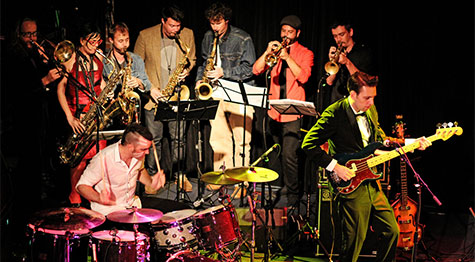When I started writing this blog six and a half years ago, it was really just a way to capture the concerts and albums I was enjoying. What started out as fairly brief write-ups blossomed into longer explorations and a huge influx of new music into my iPod. Eventually, I branched out into playlists and interviews, most creatively with my Mash Up Summit. Over time, I started receiving lots of music submissions that helped me discover a host of great artists whose music has moved me. Many of these people are not as widely known as they deserve or they weren't when I first came across them: Macklemore, Matt Stevens, Team Spirit, Atomga, That 1 Guy, Bike for Three!, Earl Greyhound... there are more than I can count.
Looking back on this run, I am proud of how I've grown as a writer. That said, this blog grew into a second, unpaid job. To be fair, this has really just been a hobby and I've been well aware that there's not any money in this kind of writing. But I've come to ask myself, what do I want to get out of this, beyond the satisfaction of polishing an 800 word essay? Ultimately, I don't think it's money or fame,but engagement. Connecting with fellow music fans and artists would close the loop for me and make it less of a solitary activity. And there are a few musicians that have been responsive, but the truth is that most of my readers are just finding me by when they google some group or album. They drop in, skim my post, and move on. At this point, I get a little over 1000 hits per month and around zero comments. I don't think that's a flaw with me or my readers; it's just the nature of review blogs and the internet.
I want to find a way to forge a connection with people and I'm not convinced that being a critic is the best answer. Other forms of writing may provide a path or I may focus on sharing my own music. In any case, I'm not shutting down Jester Jay Music, but I probably won't be posting music reviews on a regular basis.
Thanks to all of the creative people who have shared their work with me, to David Harris for letting me write and edit for Spectrum Culture, and to the friendly PR people I've met over the years.
Feel free to respond to this with a comment or message, but I'll understand if you don't : -) Cheers!
Looking back on this run, I am proud of how I've grown as a writer. That said, this blog grew into a second, unpaid job. To be fair, this has really just been a hobby and I've been well aware that there's not any money in this kind of writing. But I've come to ask myself, what do I want to get out of this, beyond the satisfaction of polishing an 800 word essay? Ultimately, I don't think it's money or fame,but engagement. Connecting with fellow music fans and artists would close the loop for me and make it less of a solitary activity. And there are a few musicians that have been responsive, but the truth is that most of my readers are just finding me by when they google some group or album. They drop in, skim my post, and move on. At this point, I get a little over 1000 hits per month and around zero comments. I don't think that's a flaw with me or my readers; it's just the nature of review blogs and the internet.
I want to find a way to forge a connection with people and I'm not convinced that being a critic is the best answer. Other forms of writing may provide a path or I may focus on sharing my own music. In any case, I'm not shutting down Jester Jay Music, but I probably won't be posting music reviews on a regular basis.
Thanks to all of the creative people who have shared their work with me, to David Harris for letting me write and edit for Spectrum Culture, and to the friendly PR people I've met over the years.
Feel free to respond to this with a comment or message, but I'll understand if you don't : -) Cheers!







 The site is just now splashing the media with a heavily borrowed look and feel. They've made changes, like the prompt for status updates is "
The site is just now splashing the media with a heavily borrowed look and feel. They've made changes, like the prompt for status updates is "

